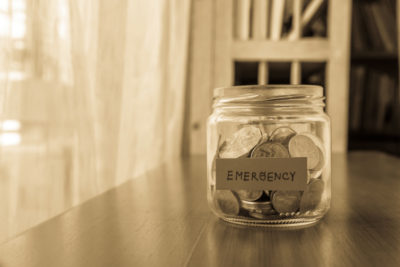Emergency Funds

An emergency fund is a stash of money set aside to cover the financial surprises life throws your way. These unexpected events can be stressful and costly. Some common emergencies include unexpected medical expenses, car repairs, and home repairs.
While most experts agree you should have an emergency fund, how much is in that fund and where it is stored is wildly debated.
How much should you keep in the fund?
You will often hear to keep 6 months of living expenses in your emergency fund. While over-saving is rarely a bad thing having that much seems like overkill to me. For example if your living expenses are $5000 a month that would be $30,000 in an account that earns you very little interest. I like the idea of having 3-6 months of housing expenses saved. So, for example if you have a monthly payment of $1000 this would mean having $6000 saved. This is a much more reasonable amount for most people to save rather quickly.
Another thing to keep in mind is that as you learn more about money and your spending things can become more predictable. Could you still have an emergency that is unpredictable? Absolutely, but by taking inventory of your expenses you can begin to plan better for the future. It’s not all that unreasonable that you may have car repair costs or need to replace a major appliance in your home.
Put the Money to Use
Traditionally, it’s recommended to keep the emergency fund in a safe accessible account. Typically this will be a savings account earning you less than 1% interest. When adjusted for inflation you are actually losing money over time.
While this is a negative the positive is that it is safe and you can access it at any time. As you get closer to your emergency fund goal you could look into investing it into something that at least gives you a slight return. There are a few things to consider when looking at where you should store your fund. It needs to be liquid, have low volatility, and be insured.
Who Needs an Emergency Fund?
I would say most people do need an emergency fund, but I would say there are certain cases where it may not be necessary. If you are properly insured (house, car, life), have little to no debt, more than one source of income or if you have access to a home equity line of credit.
If you’re on the fence about how much to save for an emergency, or even whether you should have an emergency fund at all, the truth is, there are no easy answers. It very much depends on your situation. But most detractors of the standard advice seem to agree that, when you’re struggling, it’s better to err on the side of caution.
Over-saving isn’t exactly the worst financial problem to have. But, like most money topics, the details of your emergency fund are pretty subjective. Ultimately, you’ll have to do what’s best for you. This might mean sticking to the traditional advice; it might mean bucking it a little.
Either way, there’s one thing we can all agree on: it pays to be financially prepared for an emergency.
Podcast: Play in new window | Download

[…] windows, etc. These are all expenses to plan for. Do yourself a favor and set yourself up with an emergency fund that is separate from your down payment! Another thing to consider is major life events: marriage, […]